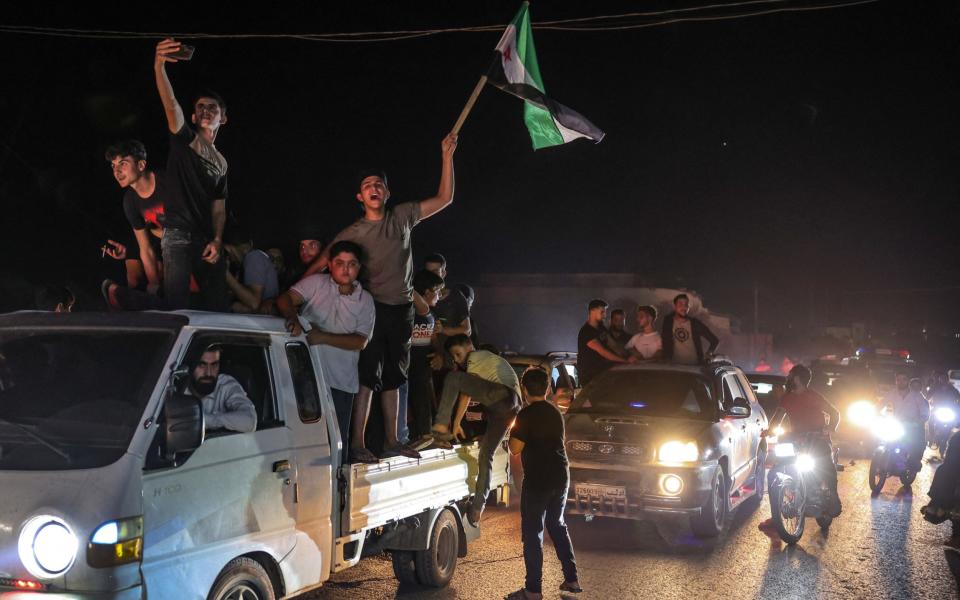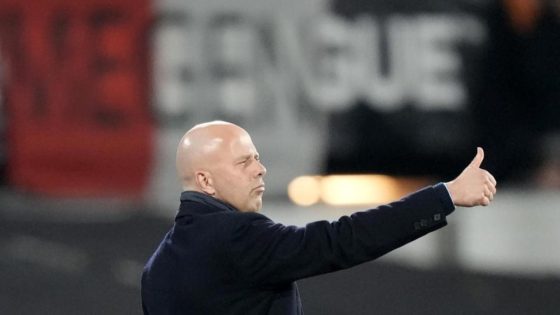Syrians danced in the streets of the northwestern city of Idlib on Saturday to celebrate the death of Hassan Nasrallah.
As news of Israel’s strike on the headquarters of Hezbollah in Beirut spread through the rebel-held city, people cheered and clapped while passing drivers honked their horns.
Guns were shot in the air as fireworks exploded in the sky in the north-western region that has been locked in conflict with president Bashar al-Assad since war broke out in 2011.
Here, Nasrallah is seen as a key ally of Assad, responsible for assisting his brutal crackdown on opponents and helping to turn the tide of the civil war in his favour.
While Hezbollah’s core motivation is to defeat Israel, Nasrallah sent thousands of soldiers to fight alongside Assad’s forces.
It was “the most beautiful day of my life,” said Ahmed al-Ali, 30, who hated Nasrallah and his foot soldiers for killing many of his friends.
Yasmine Muhammad, 30, said she felt an “overwhelming happiness that cannot be described” when she heard of Nasrallah’s death.
“I consider this revenge for the thousands of Syrians who were killed by Hezbollah, the main support of Bashar al-Assasd,” she said. “Hezbollah committed the most heinous massacres against Syrians, and it also participated in the starvation and displacement of thousands of Syrians.”
Nasrallah was a “criminal… who caused pain to the Syrian people through killing, displacement, and bombing, and his standing with Bashar al-Assad,” said Ahmad Taama, 27. “He stole our dreams and ambitions. He killed many young Syrians in the prime of their lives.”

“Unfortunately, we lost everything because of Nasrallah and Assad – our home, our work, our store. Literally, everything, because of these criminals,” said Omar Ghazal, 24.
“Now I hope that the region will be more stable and better without this criminal.”
Such sentiments, though, are an exception in the broader Middle East, where the response has been outrage after weeks of aggressive Israeli strikes into Lebanon against Hezbollah and its leaders.
Protesters broke out in the streets of Ramallah, a Palestinian city in the West Bank.
In Homs, one of the largest cities in Syria that remains under Assad’s control, Nasrallah supporters took to the streets to grieve over his death, raising Hezbollah flags and firing into the air.
News of Nasrallah’s death came as a surprise to many, particularly given his status as the leader of a fearsome fighting force.
“He was always by Bashar al-Assad’s side at all times; he had experienced fighters,” said Ghaith Mahmoud, 45, from Homs. “We do not know what and how it happened.”
“Celebrating the killing of Hassan Nasrallah is a big mistake and will have a big negative impact on Syrians in Syria, Lebanon and many countries in the world,” said Adnan al-Rifai, 25. “The fate of Syrians in Lebanon will be really scary because of Nasrallah supporters – a little while ago, I saw a video from Lebanon of Nasrallah supporters attacking Syrians; the future will really not be good.”
Others, like Ahmad al-Hassan, 30, criticised Israel for “committing massacres in Palestine and many countries in the world.”


Syria’s government also condemned the strike.
“The Zionist entity (Israel) confirms through this despicable aggression, once again… its barbarism and wanton disregard for all international standards and laws,” the foreign ministry said in a statement.
Hezbollah commemorated its late leader as “a great martyr; a heroic, daring, brave, wise, insightful and faithful leader” who led the group “from victory to victory.”
The group also pledged to “continue its jihad in confronting the enemy, in support of Gaza and Palestine, and in defence of Lebanon and its steadfast and honourable people.”
“Crimes and assassination by the occupation will only increase the determination and the insistence of the resistance in Palestine and Lebanon to go forward with all their might, bravery and pride on the footsteps of the martyrs…and pursue the path of resistance until victory and the dismissal of the occupation,” Hamas said in a statement.
Source Agencies


